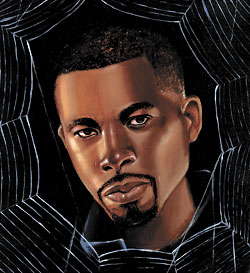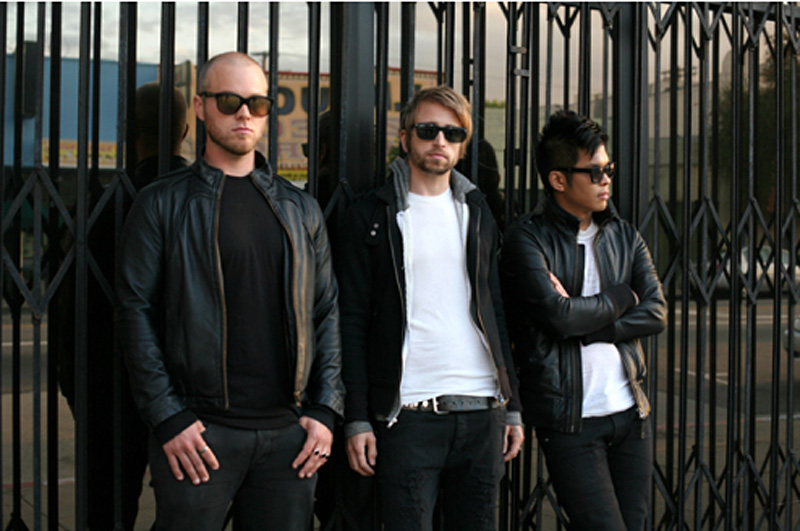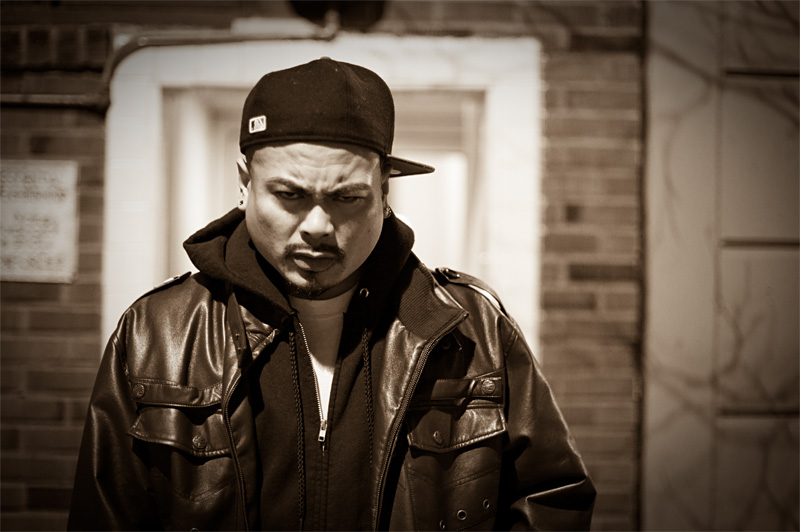I recently watched the video for GZA’s “Liquid Swords,” from the Wu-Tang Clan’s poet laureate’s classic 1995 album of the same name, for the first time since the Clinton era, and I found the shadow world contained therein just as relevant today as it was then. Indeed, the nightmare-scape of cracked records, hooded figures, and gigantic spiderwebs depicted in that small-screen realization of GZA’s tale of coke-induced bad vibes seems more apropos in the context of the madness of the Bush administration than during the relative peace and stability of Clinton’s reign.
This is one of GZA’s most salient gifts: timelessness. Whereas other MCs—including a couple of the nine-or-so members of his own New York–based crew—often yellow with age, too wrapped up in the moment to see beyond it, GZA paints lyrical pictures that while difficult to penetrate nevertheless withstand the passing years. One needn’t look any further than the “Liquid Swords” video for evidence.
Among the eerie, if opaque, images mentioned above, the video finds GZA and his producer/cousin RZA standing on a colossal clock that glows with the foreboding of a full moon, as if taunting time’s lack of effect on them. Adding to this mood, GZA delivers the bad news not in clear declarations but, as is his wont, in thick riddles whose meanings defy temporal constraints. Against the steady tick and tock of keyboards and bass, GZA declares, “I’m on a mission that niggas say is impossible/But when I swing my swords, they all chop-able.” You may not have the first clue what’s coming next, but you know it’s gonna hurt for many days to come.
Like a good horror film, GZA hits deep by withholding much. All told, Liquid Swords is not only the finest solo album to date by any Wu member, but one of the top hip-hop albums of the ’90s, right up there with Dr. Dre’s The Chronic and the Clan’s own Enter the Wu-Tang (36 Chambers).
Since at least this past December, GZA has been performing his debut disc (not counting a pre-Wu project) in its entirety all over the country. But it was only at the beginning of this summer, with the August 19 release date of his latest effort, Pro Tools, looming, that he embarked on an official Liquid Swords tour, as if he wanted to remind audiences why he mattered in the first place before the new record hit stores.
Such anxiety would be understandable. After all, at 42, GZA is the elder statesman of the aging Clan. But the fog of ageism lifts as soon as you give Liquid Swords a fresh listen. It fits comfortably into this decade with its uncomfortable truths.
The album opens with an extended excerpt from the kung-fu flick Shogun Assassin, in which a boy tells the story of his father, a “shogun’s decapitator,” and “the night that everything changed.” From there it transitions into “Liquid Swords,” rarely allowing the light to penetrate the dark for the remaining 12 songs, both in terms of mood and ease of interpretation. On the second track, “Duel of the Iron Mic,” GZA illustrates these two tendencies perfectly: “Where money don’t grow on trees and there’s thievin’ MCs/Who cut throat to rake leaves/They can’t breathe, blood splash, rushin’ fast/Like runnin’ rivers, I be that whiskey in your liver.”
He eases up a bit later with “Gold,” in favor of a more straightforward, though no less bleak, rendering of things that go bump in the night. Over a vintage RZA beat that blends operatic humming with a cultish chant and an unsteady synth line, GZA gives the U.S.’s War on Drugs the Dario Argento treatment, emphasizing the violent mentality of those working in the trade.
The next track, “Cold World,” features a memorable hook, courtesy of the crooner Life, that basically sums up the GZA worldview: “Babies crying, brothas dying, and brothas gettin’ knocked/Shit is deep on the block/And you’ve got me locked down in this cold, cold world.” As this hook suggests, Liquid Swords is sunk deep in the slashed-and-burned New York City housing projects within which it was created; the hopelessness that pervades these decaying neighborhoods still exists today—perhaps even more so.
There are a few notable exceptions on Liquid Swords to the portrayal of dire circumstance in New York’s underbelly. While “Labels” is suffused with red-hot rage, the fire smolders not in an abandoned apartment tower but inside GZA, who decries shady record companies for taking advantage of naive young artists. (Think that penurious practice continues? Course it does.) Another cut along these lines finds GZA on a torch-lit journey into the “4th Chamber” with Ghostface Killah, which finds the latter asking about the basic composition of the universe. The final standout in this regard is a brief bit of “Shadowboxin” between GZA and Method Man, in which the two Clansmen deal with forces both inside and outside themselves, classic battles between man and man, and man and self.
If GZA’s funereal laments seem too melodramatic to be considered a masterpiece, give Liquid Swords another listen. A unified vision stays forever young, even if, like Dorian Gray’s picture, the results of immortality aren’t pretty.







